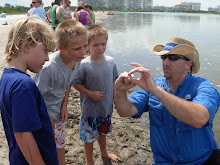 Florida has the largest complement of permitted artificial reefs in the U.S. In addition to enhancing habitat qualities, artificial reefs can improve commercial and recreational fishing and diving opportunities, provide socio-economic benefits to local communities, minimize user conflicts, and facilitate reef research.
Florida has the largest complement of permitted artificial reefs in the U.S. In addition to enhancing habitat qualities, artificial reefs can improve commercial and recreational fishing and diving opportunities, provide socio-economic benefits to local communities, minimize user conflicts, and facilitate reef research. A recent study by the University of Florida and Florida Sea Grant describes the economic benefits of artifical reefs in six coastal counties in SW Florida.
Study finds artificial reefs are economic boon, enjoy widespread public support by Mickie Anderson , UF/IFAS News
A new Florida Sea Grant study of artificial reef use in six Southwest Florida counties shows the structures lure a lot more than fish.
The reefs, which provide habitat for popular sport fish and other marine life, pulled more than $253 million into the region during one year, the study found. Though it costs nothing more than a saltwater fishing license to use the submerged structures as a fishing spot, anglers spend money on food, lodging, fuel, tackle and other necessities.
The UF and Florida Sea Grant study, TP-178 Economic Impacts of Artificial Reefs for Six Southwest Florida Counties, looked at money generated by artificial reefs in Pinellas, Hillsborough, Manatee, Sarasota, Charlotte and Lee counties in 2009. Researchers found that $136 million came from residents, while $117 million was spent by visitors.
Bob Swett, the UF associate professor and Florida Sea Grant extension specialist who led the study, said he was struck most by the contrast between the income generated and the small amount counties invest in the reefs — ranging from $20,000 to $60,000 a year for each county, with some years requiring little to no spending. The reefs also enjoy private support, such as local marine contractors who donate materials and in-kind labor.
“That shows me that there’s a lot of bang for the buck in terms of what they get out of the artificial reef programs,” said Swett, also a member of UF’s Institute of Food and Agricultural Sciences.
Chris Neal, who works for the Scuba Quest dive shop chain’s Sarasota location, said his company frequently takes groups of divers out to artificial reefs because the man-made structures allow divers to see such a wide variety of fish and wildlife.
“You can see all kinds of fish – flounder, hogfish, snapper and grouper,” he said.
Besides asking residents about their reef-related spending, the UF researchers also asked boaters who use reefs and those who do not their opinions about spending public money to build and maintain the structures, which are typically underwater piles of large, hollow concrete blocks where fish can hide.
 While users were more likely to support such spending (county responses ranged from 83 percent to 95 percent, in favor), Swett said he was also impressed by non-reef users’ enthusiasm. Their support for spending public money on reefs ranged from 61 percent to 71 percent.
While users were more likely to support such spending (county responses ranged from 83 percent to 95 percent, in favor), Swett said he was also impressed by non-reef users’ enthusiasm. Their support for spending public money on reefs ranged from 61 percent to 71 percent.Artificial reefs are used for a number of activities, among them: enhancing recreational and charter fishing and diving, boosting reef fish populations and aiding scientific research.
For more than three decades, Florida Sea Grant has contributed to the evolution of the state’s reef-building community through research, scientific conferences and outreach activities. Many of its coastal county-based extension faculty are involved in some activity related to artificial reefs.
Florida’s artificial reef program, created in 1982, includes more than 2,500 documented artificial reefs in the state’s coastal waters. About one-third of them were the subject of the recent economic study.
Other survey highlights: on average, more than 5,600 southwest Florida residents use artificial reefs every day; for-hire fishing enterprises, including fishing guides, charter boats and party boats, accounted for nearly $90 million in spending, and artificial reefs support more than 2,500 full- and part-time jobs.
The researchers used a combination of mail, telephone and e-mail to collect survey responses.
The study was funded by the U.S. Fish and Wildlife Service, the Florida Fish and Wildlife Conservation Commission, the West Coast Inland Navigation District and the participating counties. Besides Swett, the research team included Chuck Adams, a marine economics professor; Sherry Larkin, associate professor in resource economics, extension scientist Alan Hodges and postdoctoral associate Thomas J. Stevens.




A few days ago, I went to catch fish with Charter and Guidefishing .Their team is very expert to catch fish. To get more information.
ReplyDelete